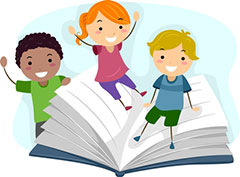 I was talking to a woman today, and she, not knowing that I was a writer of books for young people, was telling me about the stories she made up for her grandchild. “My granddaughter so loves my stories,” she told me, “I’m thinking of sending them in and getting them published.”
I was talking to a woman today, and she, not knowing that I was a writer of books for young people, was telling me about the stories she made up for her grandchild. “My granddaughter so loves my stories,” she told me, “I’m thinking of sending them in and getting them published.”
It reminded me of another conversation I had years ago with a minister. “My wife,” he said, “is looking for something to do in her spare time, something that would earn some money. She loves kids. You write books for kids. Think you could tell her how to write them?”
Or the teacher who told me she had written a long poem about talking flowers and her students “loved it. I’m thinking of having it published. Who is the best publisher?”
Note that the word “love,” appears here often. In part, then, these comments are about the love for children. More power to these good folks.
But good children’s books have a built in contradiction, something embedded in George Bernard Shaw’s comment that, “Hard writing makes easy reading.”
The more the writer works to make the reading of the text flow with grace and ease, the more the reader merges with your story, the more the reader takes the experience in the book and makes it her/his own experience, the more successful the book.
Which is to say, the better the writer, the more the writer seems not to be there. I suspect that’s one of the reasons so many people want to write books for kids. They love the kids. Good. They don’t think of the writing. Not good.
1 thought on “The love for children”
Roald Dahl always said that writing for children was even harder than writing for adults because adults have a shorter attention span and adults tend to forget what they enjoyed to read as children. A clumsily-written story destroys the reading experience.